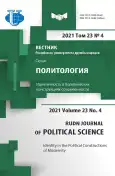Политические импликации православной идентичности: пример Всемирного русского народного Собора
- Авторы: Шихер Н.Д.1,2
-
Учреждения:
- Российская академия народного хозяйства и государственной службы при Президенте Российской Федерации
- Аппарат Уполномоченного по правам человека в Российской Федерации
- Выпуск: Том 23, № 4 (2021): Идентичность в политических конструкциях современности
- Страницы: 600-613
- Раздел: ГРАНИ ИДЕНТИЧНОСТИ В СОВРЕМЕННОЙ РОССИИ
- URL: https://journal-vniispk.ru/2313-1438/article/view/322097
- DOI: https://doi.org/10.22363/2313-1438-2021-23-4-600-613
- ID: 322097
Цитировать
Полный текст
Аннотация
В статье исследованы концептуальные идеи Всемирного русского народного Собора, действующего под эгидой Русской Православной Церкви, относительно реализации права на свободу совести и положения религиозных объединений в России. Также изучены выступления на Соборах первых лиц государства на предмет их отношения к идейному содержанию деятельности данной организации. На основе полученных данных автором предпринята попытка соотнести озвученные на Соборах предложения по изменению отдельных аспектов в религиозной сфере с реформами российского законодательства о свободе совести. В результате данного исследования выявлено поразительное совпадение между двумя указанными факторами: обсуждаемые на Соборах положения, как правило, спустя некоторое время находили отражение в российских нормативно-правовых актах. Не имея достаточных оснований заявлять об однозначной причинно-следственной связи между соборными идеями и реформированием законодательства, можно, во всяком случае, вести речь о значительном влиянии деятельности Всемирного русского народного Собора на политику государства в области реализации права на свободу совести в современной России.
Об авторах
Наталья Дмитриевна Шихер
Российская академия народного хозяйства и государственной службы при Президенте Российской Федерации; Аппарат Уполномоченного по правам человека в Российской Федерации
Автор, ответственный за переписку.
Email: raspberry33@yandex.ru
ORCID iD: 0000-0002-0141-3814
аспирант кафедры национальных и федеративных отношений РАНХиГС, начальник отдела защиты политических прав Аппарата Уполномоченного по правам человека в Российской Федерации
Москва, Российская ФедерацияСписок литературы
- Bogachev, M.I. (2018). Continu abitur: Social and Religious Life of Russian Regions. State, Religion and Church in Russia and Worldwide, 3(36), 224-238.
- Bogachev, M.I., & Sorvin, K.V. (2020). Politics in the Church: For Whom Do Orthodox Priests Call to Vote? State, Religion and Church in Russia and Worldwide, (3), 331-361.
- Ierusalimskiy, Yu.Yu., & Rudakov, A.B. (2019). The role of the World Russian People’s Council in the consolidation of Russian society in the 1990s. House of the Romanovs and the Yaroslavl region: conference proceeding (рр. 437-444). Yaroslavl: Indigo. (In Russian)
- Ierusalimskiy, Yu.Yu., & Rudakov, A.B. (2021). Issues of education, science and culture in the work of the World Russian People’s Council at the end of the twentieth century. Bulletin of Moscow Region State University. History and Political Science, (2), 117-124. (In Russian)
- Meshcheryakova, A.F. (2020). State-church interaction as a factor in the formation of a secular state and civil society in Russia. Electronic scientific journal “Science. Society. State”, 8(1), 27-36. Retrieved from http://esj.pnzgu.ru (In Russian)
- Mchedlova, M.M. (2020). Metaphysics of russian society: ideological constructions, institutional configurations and contemporary cognitive shift. Pushkin Leningrad State University Journal, (3), 59-79. (In Russian)
- Mchedlova, M.M. (2020). Religion in Political Construction of Modernity: Editorial Introduction. RUDN Journal of Political Science, 22(4), 541-546. (In Russian)
- Mchedlova, M.M., & Kazarinova D.B. (2020). The identity politics: competition of new theoretical meanings and political strategies. Political Science, (4), 13-35. (In Russian)
- Mchedlova, M.M., & Kofanova, E.N. (2020). Russia in Anticipation of Changes: Religious Factor and Socio-political Preferences. RUDN Journal of Political Science, 22(1), 7-21. (In Russian)
- Pinkevich, V.K. (2020). The Politicization of Society and the Religious Issues in Modern Russia. RUDN Journal of Political Science, 22(4), 647-663. (In Russian)
- Rudakov, A.B. (2020). Issues of demography and health in the perception of the participants of the IV World Russian National Council (1997). Modern science: actual problems of theory and practice. Humanities, (6-2), 19-22. (In Russian)
- Shchipkov, A.V. (2018). Questions of ideology. Moscow: Abris. (In Russian)
- Shchipkov, A.V. (2021). Discourse of Orthodoxy. Description of the ideological space of modern Russian Orthodoxy. Moscow: Moscow Patriarchate of the Russian Orthodox Church publ. (In Russian)
Дополнительные файлы









